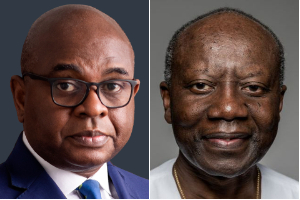The Disciplinary Committee of the FA's ruling on a protest lodged by Real Tamale United and Accra Great Olympics against Obuasi Goldfields for fielding a player - Valentine Atem Fondongbeze, a Cameroonian on the basis that the player's job permit was a subject of contention.
We publish below the application from Goldfields for a review of the review.
APPLICATION FOR REVIEW
Introduction1. Sometime in July 2003 Goldfields Football Club (the "applicant") applied to register Valentine Atem Fondongbeze, a Camerounian, (the "player") as its player under the Ghana Football Regulations (the "Regulations"). Article 33(4) of the Regulations
required for such registration (a) the player's International Transfer Certificate ("JTC"), work permit and residence permit.
2. The applicant on 30 June 2003 applied to the Minister for Interior for the grant of a 3-year residence and work permits to enable the player participate in the 2003 Premier League (Exhibit GF 1). The application was supported by a commendation by GFA, also dated 30 June 2003 (Exhibit GF 2). The Minister duly approved a 2-year work/residence permit and by his letter ref No SCR 1575/SF.193 dated 17 July 2003 (Exhibit GF 3) informed the Director. The letter advised the applicant to contact the Director for Immigration to "complete the requisite formalities concerning the grant".
3. Based on the above documents and the player's ITC he was registered on 18 July 2003 and issued license No 396028, duly signed by the GFA Chairman. Believing that the registration was complete and regular, having received the active support and involvement of the GFA and the Minister, the club proceeded to field the player in the match between the applicant and Real Tamale United Sporting Club ("RTU") on 23 July 2003. On 6 August 2003 the player again played in a match between the applicant and Accra Great Olympics Football Club ("Olympics").
4. Although the registration of the player was of little concern initially, the outcome of those matches evoked protests against his registration. RTU and Olympics filed protest letters dated 30 July 2003 and 8 August 2003 that the player was "unqualified". The Disciplinary Committee of GFA consolidated and heard the protests and dismissed them on 29 August 2003. The protesters then filed appeals, which the Appeals Committee of GFA on 11 November 2003 allowed. The Appeals Committee declared RTU and Olympics winners of their respective matches with credits of three goals and three points each. The applicant was fined ?2 million with a further 3 point loss (Exhibit GF 4). It is against such decision that the applicant applies herein for review.
Grounds for review
5. The entire determination of the matter in issue by the Appeals Committee is contained in paragraph 7 of its ruling thus:"After listening to the arguments advanced by learned counsel, and having critically analysed the evidence on record, it is our view that at the time of the registration of player Valentine Atem on 18 July 2003 he did not have the necessary residence and work permits issued under Act 573 as required by Article 33(4)(ii) of the GFA Regulations. The player was therefore unqualified to play in the said two matches."
6. The applicant submits that the holding of the Committee that the player did not possess valid residence and work permits questions and indeed sets aside the Minister's grant of "work/residence permit" on 17 July 2003. Also the Committee impliedly castigates not only the involvement of the GFA in sponsoring the application to the Minister for those permits but its acceptance of the Minister's permits for registration.
7. As can be seen from paragraph 5 above the Committee did not give reasons for its decision; it merely handed down its conclusion. The applicant contends that it followed the existing process for registration and if the Committee was minded to discontinue such process it was only fair that it would come out clearly in its decision to that effect. The applicant contends with due respect to the Committee that the matter was of public importance and that the interests of justice would be served if the Committee revisited its decision. The applicant will demonstrate below that the ruling is erroneous both in law and fact and that the player indeed possessed valid work and residence permits at the date of registration.
Work Permit
8. Section 24 of the Immigration Act 2000 (Act 573) provides that "a person shall not employ any foreign national in Ghana except in accordance with a permit granted by the Immigrant Quota Committee established under section 25 of this Act" thus creating the impression, which appears to have influenced the Appeals Committee, that the Committee, not the Minister, is the appropriate body to grant a work permit. The impression is corrected in section 27(1) which defines the true role of the Committee thus:"The Committee is responsible for the consideration of all applications for immigrant quota and work permit and shall submit its recommendations to the Minister for the issue of an immigrant quota and work permit.
9. Section 27(3) amplifies further the power of the Minister to "issue a work permit to any person who is not a prohibited immigrant, a visitor, tourist, transit passenger or student" etc.
10. It was obviously in pursuance of the powers so vested in the Minister that he granted the work permit to the player and informed the Director of Immigration accordingly by GF 3. The Minister's residual power to grant a residence permit to cover the work permit is discussed below.
11. The applicant contends further that the Committee appears to have relied unduly on the wording of article 33(4) of the GFA Regulations which required for the registration of a player "the necessary work and residence permits issued by the Ghana Immigration Service". Plainly, the Service does not issue work permits and the requirement of a work permit "issued by the Service" is in conflict with section 27(1) of the Act which vests the grant of work permits exclusively in the Minister.
12. Happily the Minister by GF 3 rightly referred the grant to the Director for Immigration merely to "complete the requisite formalities concerning the grant". The Director was not authorised or required to grant a permit afresh. It is noteworthy further that the Director was not required to complete the formalities for the grant but merely to complete the formalities concerning the grant by the Minister. In the former situation the formalities would lead to a grant while the latter situation predicated a grant.
13. In short the Minister had granted a work permit to the player and this was conceded in a letter from the Service dated 14 August 2003 (Exhibit GF 5) to Olympics. The work permit was identified in the letter as "No SCR 1575/SF.193 from the Ministry of Interior dated 17th July, 2003." That ref No recalls exhibit GF 3. The concession by the Immigration Service that the Minister, not the Service, issues permits placed the matter beyond further argument. Secondly it signifies the recognition of the player by the Service as the holder of a valid work permit since 17 July 2003.
14. The applicant contends that the holding that the player was not a holder of a valid work permit at the date of the registration is therefore misconceived and ought to be set aside.
Residence Permit
15. The applicant submits under this head that the holding of the Committee that the player did not hold a valid residence permit at the date of the registration is perverse and ought to be set aside.16. Proceeding on first principles, the applicant argues that a holder of a valid work permit must necessarily hold a valid resident permit covering the period in the work permit for such work permit holder to remain and work in Ghana. This logical reality obviously exercised the mind of the Minister when he decided to grant "work/resident permit" to the player. Did he have the power to grant such resident permit? This Committee thinks not but the applicant submits that the Minister had the power so to act.
17. Section 13 states the Immigration Act empowers the Director to grant resident permits but not exclusively. Section 51 vests in the Minister a residual power that empowers him so to grant a "work/resident permit". The section states thus:
"Notwithstanding anything to the contrary in this act the Minister may revoke or waive any visa, permit, conditions of entry and any requirement on grounds of:
(a) national interest;
(b) compassionate circumstances; or
(c) any other reasonable ground."
18. The amplitude of the power so vested in the Minister can be seen in the word "waive" which is defined in the Chambers 21st Century Dictionary as "to refrain from enforcing a rule or penalty". In effect the residual powers empower the Minister to override any provision under the Act! And it was reasonable that he should act quickly in order that the season's games would not be frustrated.
19. The Minister's two-year grant of residence permit was valid. The request to the Director in GF 3 to "complete the requisite formalities concerning the grant" was merely to acknowledge the grant in the records of the Service and affix the requisite stamps in the player's passport to signify the grant. Even if the Director omitted to comply with the request the player would not be an illegal immigrant; the Minister for Interior had authorised him to stay under powers vested in him under section 51 of the Immigration Act and no law enforcement agency, let alone a football club, can question the Minister's act.
20. Unfortunately the Director of Immigration misconstrued 1ier role in formalising the Minister's grant of residence and work permits; she chose rather to make a fresh grant of residence permit for one year only with effect from "25th July 2003 ... on the authority of Work Permit Number SCR 1575/SF. 193 from the Ministry of Interior dated 17th July, 2003". Going by the Director's act the footballer was the holder of a valid work permit but from 17 July 2003 to 25 July 2003 (when the Director purported to make a fresh grant) he was an illegal immigrant! The inconsistency flies in the face of logic and reality. Besides it purports to set aside the Minister's administrative decision.
21. The applicant contends that the true status of the player derives from the residence/work permit granted by the Minister but not from the residence permit that the Director purported to grant. In the circumstances the applicant contends that the finding of the Appeals Committee that the player did not posses a valid residence permit at the date of registration is in error and ought to be set aside.
Composition and jurisdiction of the Appeals Committee
22. The appellant contends that the Committee erred in not ascertaining the legality of its composition under the Statutes of the Ghana Football Association 2003 and Ghana Football Association Regulations. Whereas article 16(b) of the Statutes provides for a Committee composed of persons including the General Secretary, article 43(1l)(b)(ii) provides for the General Secretary or his representative. A conflict is discernible which the Committee ought to have resolved in favour of the Statutes. Rather the Committee permitted Mr Emmanuel Gyimah, a representative of the General Secretary to sit. Regrettably his name was omitted from the ruling as a pannel member.23. The applicant contends that the error of the Committee in this regard strikes at its jurisdiction and that the issue is best referred to Congress for determination.












